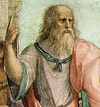The tottering Tree of Life rots a little more …

Earlier today, we were discussing Massey University (New Zealand) evolutionary biologist’s attempt to jam non-Darwinian processes into Darwinism. Because, essentially, if Darwinism means what it has meant in the last 50 years (the Tree of Life), it is not true. So Darwinism must now incorporate material that Darwinists would otherwise reject, so that at least something about it can be true.
Friends write to say that we can expect many more articles like this in the near future, for example
a new Open Access article by Maureen O’Malley and Eugene Koonin: Read More ›





